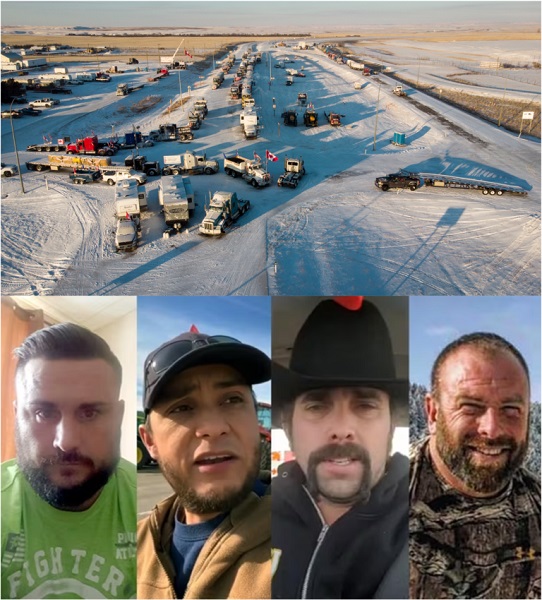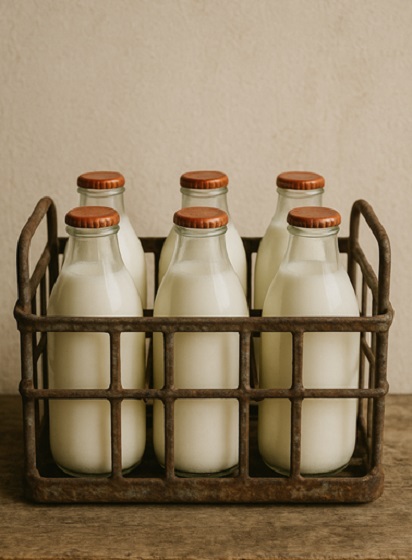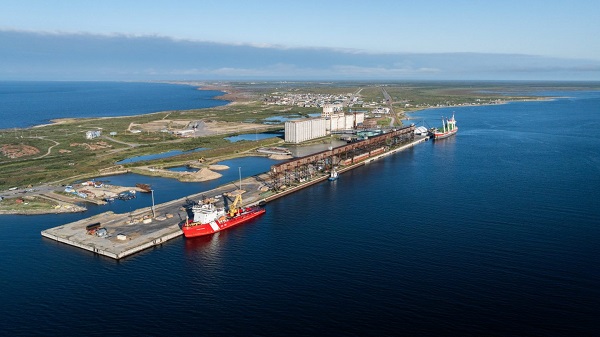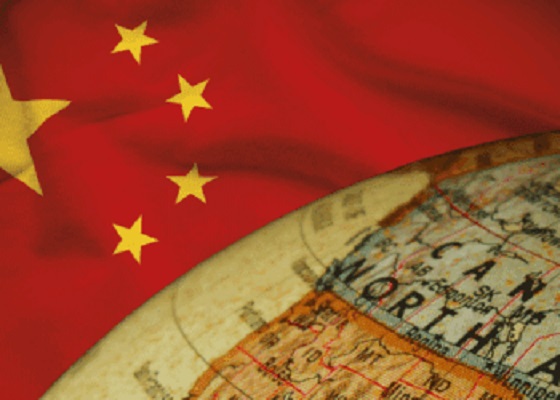Frontier Centre for Public Policy
The Worrisome Wave of Politicized Prosecutions

Unusual punishment: The 2022 truckers’ protest at the Coutts, Alberta border crossing (top) led to charges against four men (bottom left to right), Chris Carbert, Tony Olienick, Jerry Morin and Chris Lysak; Morin and Lysak were held in custody for almost two years while the other two are still in prison. (Sources of photos: (top) The Canadian Press/Jeff Mcintosh; (bottom) CBC)
From the C2C Journal
By Gwyn Morgan
Shaping criminal charges, bail decisions or prison sentences around an accused person’s political or religious beliefs is utterly odious – a hallmark of tinpot tyrannies and totalitarian hellholes. Such practices have no place in any constitutional nation, let alone a mature democracy that presents itself as a model to the world. But that is increasingly the situation in Canada, writes Gwyn Morgan. Comparing the treatment of protesters accused of minor infractions to those of incorrigible criminals who maim and kill, Morgan finds a yawning mismatch that suggests political motivations are increasingly a factor in today’s criminal justice system.
On January 29, 2022, a small convoy of trucks headed down to the U.S. border crossing at Coutts, Alberta to join in the nationwide protests against the Covid-19 vaccine mandate that the Justin Trudeau government had recently imposed on cross-border truckers – the very people Trudeau had previously described as “heroes” for delivering food and other essentials in the depths of the pandemic. Joined by many locals in pickup trucks and farm machinery, the truckers’ border protest turned into a full-scale blockade that would last 17 days. Just as it appeared to be settling into an extended stalemate, heavily armed police tactical teams swooped down upon several locations and arrested 14 protesters, charging four with the ominous crimes of conspiracy to commit murder (of police officers), mischief, a raft of weapons offences and uttering threats. These were bewildering accusations given the overall context of the event.
As the blockade almost instantly dissolved given that none of the protesters wanted to be linked to potentially violent offenders, the four men – Chris Lysak, Jerry Morin, Chris Carbert and Tony Olienick – were locked away. Lysak and Morin spent 723 days – nearly two years – in pre-trial custody, 74 of which Morin was kept in solitary confinement. Finally, after their new lawyer, Daniel Song, filed a Charter of Rights and Freedoms application demanding that the courts re-examine the case, the Crown suddenly accepted a plea deal on much lesser firearms charges. One month ago – on February 6 – Morin and Lysak were abruptly released. But they had already served the equivalent of a typical sentence for a serious crime in Canada – manslaughter or assault, say. Hard-working tradesmen with young families, Morin and Lysak will never get those two years back. Carbert and Olienick remain in prison and still face the full raft of charges; their trial is to begin in May.
Contrast this with the recent case of a mother and daughter – Carolann Robillard and Sara Miller, 11 – who were fatally stabbed in a horrific random attack outside an Edmonton school. Their accused killer, Muorater Arkangelo Mashar, had a long criminal record of assaults, assault with a weapon and robbery; he had been released from custody 18 days prior to the murders. Such events are no longer exceptions in Canada’s criminal justice system. They’re not cases of someone “falling through the cracks” – getting out due to a glitch or individual act of incompetence. They are routine. This is how things are now done in Canada. Vancouver police, for example, catch and release the same criminal offenders over and over, sometimes close to 100 times, because they always make bail.
By contrast, the four Coutts protesters were repeatedly denied bail despite having no criminal records. For this reason, social media users raised the possibility that they were, in effect, political prisoners being persecuted for having stood up so defiantly against the vaccine mandate and embarrassing Trudeau. Just a week or so following their arrests, over 3,000 km away on Parliament Hill, the Trudeau government moved against a peaceful protest that was breaking no significant laws other than, possibly, some municipal noise ordnances and parking bylaws. Police arrested and incarcerated four prominent protesters whom there was no credible basis to imprison and hold without bail. Of the four, Chris Barber was released within a day. Pat King and George Billings, however, were denied bail despite facing only minor mischief charges; they would spend months in jail. Billings eventually pled guilty to one charge and was released, while King’s trial has yet to begin.

Political prisoners: At the Freedom Convoy protest in Ottawa (top), police arrested (bottom left to right) Chris Barber, Pat King and George Billings; Barber was released but King and Billings were denied bail despite facing only minor mischief charges. (Sources of photos: (top) Maksim Sokolov (Maxergon), licensed under CC BY-SA 4.0; (bottom left) Public Order Emergency Commission; (bottom middle) Calgary Herald; (bottom right) The South Peace News)
Business
It’s Time To End Canada’s Protectionist Supply Management Regime

From the Frontier Centre for Public Policy
Senior Fellow Brian Giesbrecht says it’s time to stop coddling millionaire dairy barons. Supply management drives up grocery bills, blocks trade and makes Canada a global joke. Australia fixed it—we can too.
Canadians are paying the price for political cowardice
Canada’s outdated supply management system forces the average Canadian family to spend $500 a year to protect a small group of wealthy dairy producers, most of them millionaires. This protectionist regime enriches a few at the expense of many, drives up food prices and undermines Canada’s credibility in trade negotiations. It no longer fits the times, and it has to go.
Let’s be clear: this isn’t about attacking dairy farmers. Most are hardworking, conscientious people who’ve built their lives around a system they didn’t create. They rise early, work long hours, rarely take holidays and deserve fair compensation if the system is dismantled. But good intentions don’t justify bad policy.
Under supply management, the government tightly controls how much dairy, poultry and eggs Canadian farmers can produce and imposes steep tariffs—sometimes more than 400 per cent—on imported products to limit competition. The result is artificially high prices, limited consumer choice and retaliatory tariffs from other countries.
This system, once designed to protect small family farms, is now dominated by fewer than 10,000 large operations, many worth millions. It no longer serves its original purpose, yet it remains in place because of political cowardice. Pierre Poilievre and Mark Carney both know the system is flawed but won’t challenge it. Why? Because it’s popular in Quebec, a province with significant electoral influence. No party wants to risk alienating those voters.
Australia and New Zealand once faced similar challenges. They phased out their systems, fairly compensated farmers through levies and built globally competitive dairy sectors. We can too. Trump’s return to power may force our hand, but it also gives us an opportunity to act on what we should have done long ago.
Even without outside pressure, the inefficiency is clear. Every year, billions of litres of milk are dumped when quotas are exceeded. At the same time, Canadian companies like Saputo are forced to relocate abroad to reach global markets. Our artisan cheese producers are trapped in a small domestic economy while foreign markets block our exports in retaliation for our own protectionism.
The hypocrisy is glaring. We call for free trade but defend a system that imposes up to 400 per cent tariffs on imports. Our global partners are right to scoff.
Trump did. In a social media post, he wrote: “Canada is a very difficult country to TRADE with, including the fact that they have charged our Farmers as much as 400 per cent Tariffs, for years, on Dairy Products.” And in his July 10 letter announcing 35 per cent tariffs on Canadian goods, he added: “Canada charges extraordinary Tariffs to our Dairy Farmers—up to 400 per cent—and that is even assuming our Dairy Farmers even have access to sell their products to the people of Canada.”
This isn’t just an American objection. High-quality dairy from France and Germany can’t be sold in Canada because of our import barriers. Their governments respond by blocking our dairy exports. Canada loses jobs, investment and credibility.
Some defenders claim foreign dairy is unsafe. But countries like France and Germany have food safety standards as strict as ours. And Canada already has legal mechanisms to block substandard imports. We don’t need tariffs for that.
Former Liberal MP Martha Hall Findlay said it plainly: supply management is a dead end. So did Maxime Bernier, who made it a central issue during his bid for the Conservative leadership. The dairy lobby made sure he didn’t win. And we’re still stuck.
Now, all parties have voted to exclude supply management from current trade talks. We are entering negotiations that demand fair treatment while protecting one of the most unfair systems in the developed world. It’s a national embarrassment.
But this can change. A phased buyout funded by a modest, temporary levy—not taxpayer dollars—could end supply management and open our dairy sector to global opportunity. Australia and New Zealand proved it works. Their citizens don’t pay $10 for butter or yogurt. Neither should we.
It’s time to stop protecting the past. Dismantle the system. Free our producers. Lower grocery bills. Restore our credibility.
Maxime Bernier saw it in 2017. Trump is saying it again in 2025.
This time, we’d better listen.
Brian Giesbrecht is a retired judge and senior fellow at the Frontier Centre for Public Policy.
Frontier Centre for Public Policy
Canada’s New Border Bill Spies On You, Not The Bad Guys

From the Frontier Centre for Public Policy
By Lee Harding
Lee Harding warns that the federal government’s so-called border bill lets officials snoop on your data, ban big cash payments and even open your mail – all without a warrant
Think Bill C-2 is about stopping fentanyl? Think again. It lets the feds snoop your data, open your mail and ban big cash payments – no warrant needed
The federal government is using the pretext of border security, the fentanyl crisis and transnational crime to push through Bill C-2, legislation that dangerously expands surveillance powers, undermines Canadians’ privacy and restricts financial freedom. This so-called Strong Borders Act is less about protecting borders and more about policing citizens.
Bill C-2, a 130-page omnibus bill introduced on June 3, grants broad new powers to government agencies to spy on Canadians and share personal information with foreign countries. A more honest title might be the Snoop and Gossip Act.
Among its most intrusive provisions, the bill would make it illegal for any business, profession or charity to accept cash payments over $10,000, even if made in smaller, related transactions. Want to pay a contractor $10,001 in five separate payments for home renovations? Too bad.
The Justice Centre for Constitutional Freedoms quickly condemned the move. “Restricting the use of cash is a dangerous step toward tyranny and totalitarianism,” the organization posted to X. “Cash gives citizens privacy, autonomy, and freedom from surveillance by government and by banks.”
Under Bill C-2, internet service providers could be compelled—under threat of fines—to hand over names, locations and “pseudonyms” of users without a warrant. Any peace officer or public officer can demand this data by merely claiming “reasonable grounds to suspect” an offence “has been or will be committed.”
It doesn’t stop there. The bill would also authorize the government to open private mail under the same vague threshold of suspicion.
Experts in law and privacy say the bill is a massive overreach. University of Ottawa internet law scholar Michael Geist and Kate Robertson of the University of Toronto’s Citizen Lab both point out that successive federal governments have sought to expand internet surveillance for years, but Bill C-2 goes further than ever before.
“Bill C-2’s big brother tactics combine expansive warrantless disclosure with unprecedented secrecy,” Geist warns. He adds that the bill “overreaches by including measures on internet subscriber data that have nothing to do with border safety or security but raise privacy and civil liberties concerns.”
If the intent were truly to combat fentanyl trafficking and transnational crime, better tools already exist. Conservative MP Frank Caputo pointed out that the bill has 16 parts but says nothing about increasing penalties or jail time for fentanyl traffickers.
“There is nothing about bail in the bill,” Caputo said during early debate on the bill. “In this omnibus bill, it says that offenders can serve their sentence for trafficking in fentanyl from their couch.”
Bloc Québécois MP Claude DeBellefeuille argued that strengthening border security requires more boots on the ground. Two rural border crossings in her riding recently had their staffed hours cut in half.
“It is estimated that the CBSA (Canada Border Services Agency) already has a shortage of between 2,000 and 3,000 border services officers for current duties. If they are given new responsibilities, however necessary, there will be an even greater shortage,” she said.
Not only does Bill C-2 contradict Supreme Court precedent. It also sets the stage for Canada to share sensitive personal information with foreign governments. In 2014, the court ruled that Canadians have a “reasonable expectation of privacy in the subscriber information” provided to internet service providers and that police requests for such data amount to a “search” requiring a warrant.
Robertson warns that the bill not only defies this precedent but also enables Canada to share this dubiously acquired information with 49 other countries under the Second Additional Protocol to the Cybercrime Convention. Canada signed the agreement in 2023 but hasn’t ratified it. Bill C-2 would make that possible.
She calls the protocol’s weak human rights safeguards “a direct threat to existing protections under international human rights law.” Robertson co-authored a submission urging the Department of Justice to reject the 2AP and instead support data-sharing frameworks that are built on consistent rights protections across all signatories.
Further complicating matters, Canada is in negotiations with the United States over a data-sharing agreement under that country’s CLOUD Act. Canada’s willingness to comply may reflect lingering trade pressures from the Trump administration, pressures that could again push Canada to compromise its legal independence and citizens’ rights.
This bill should be scrapped or thoroughly revised. Canadians should not have to surrender their privacy and human rights to serve a global law enforcement agenda that disregards civil liberties. If the line between national security and authoritarianism is erased, the greatest threat to Canadians may no longer be drug traffickers—it may be their own government.
Lee Harding is a research fellow at the Frontier Centre for Public Policy.
-

 Education1 day ago
Education1 day agoWhy more parents are turning to Christian schools
-

 Addictions2 days ago
Addictions2 days agoAfter eight years, Canada still lacks long-term data on safer supply
-

 Alberta1 day ago
Alberta1 day agoOPEC+ is playing a dangerous game with oil
-

 Alberta1 day ago
Alberta1 day agoUpgrades at Port of Churchill spark ambitions for nation-building Arctic exports
-

 Business1 day ago
Business1 day agoIs dirty Chinese money undermining Canada’s Arctic?
-

 National2 days ago
National2 days agoLiberals push to lower voting age to 16 in federal elections
-

 COVID-191 day ago
COVID-191 day agoJapan disposes $1.6 billion worth of COVID drugs nobody used
-

 conflict1 day ago
conflict1 day agoOne of the world’s oldest Christian Communities is dying in Syria. Will the West stay silent?









